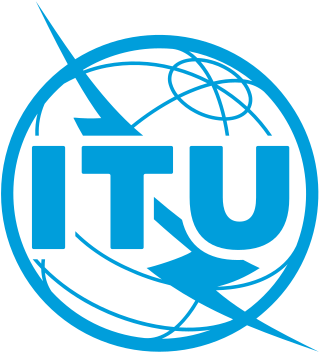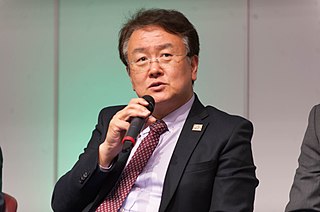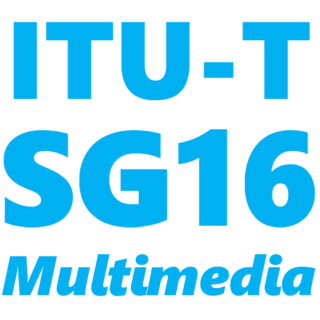Related Research Articles
Corporate titles or business titles are given to corporate officers to show what duties and responsibilities they have in the organization. Such titles are used by publicly and privately held for-profit corporations, cooperatives, non-profit organizations, educational institutions, partnerships, and sole proprietorships also confer corporate titles.

The International Telecommunication Union Telecommunication Standardization Sector (ITU-T) is one of the three Sectors (branches) of the International Telecommunication Union (ITU). It is responsible for coordinating standards for telecommunications and Information Communication Technology, such as X.509 for cybersecurity, Y.3172 and Y.3173 for machine learning, and H.264/MPEG-4 AVC for video compression, between its Member States, Private Sector Members, and Academia Members.

The International Telecommunication Union (ITU) is a specialized agency of the United Nations responsible for many matters related to information and communication technologies. It was established on 17 May 1865 as the International Telegraph Union, making it the oldest UN agency. Doreen Bogdan-Martin is the Secretary-General of ITU, the first woman to serve as its head.

The Nippon Telegraph and Telephone Corporation (NTT) is a Japanese telecommunications holding company headquartered in Tokyo, Japan. Ranked 55th in Fortune Global 500, NTT is the fourth largest telecommunications company in the world in terms of revenue, as well as the third largest publicly traded company in Japan after Toyota and Sony, as of June 2022.

NTT Docomo, Inc. is a Japanese mobile phone operator. The name is officially an abbreviation of the phrase, "do communications over the mobile network", and is also from a compound word dokomo, meaning "everywhere" in Japanese. The company is headquartered in Sanno Park Tower, Nagatachō, Chiyoda, Tokyo. Docomo provides phone, video phone, i-mode (internet), and mail services. It is the largest wireless carrier in Japan, with 82.632 million subscribers as of March 2021.

David A. Gross is an American lawyer and former U.S. Coordinator for International Communications and Information Policy at the U.S. State Department's Bureau of Economic and Business Affairs.

Freedom of Mobile Multimedia Access (FOMA) is the brand name of the W-CDMA-based 3G telecommunications services being offered by the Japanese telecommunications service provider NTT DoCoMo. It is an implementation of the Universal Mobile Telecommunications System (UMTS) and was the world's first 3G mobile data service to commence commercial operations.
4G is the fourth generation of broadband cellular network technology, succeeding 3G and preceding 5G. A 4G system must provide capabilities defined by ITU in IMT Advanced. Potential and current applications include amended mobile web access, IP telephony, gaming services, high-definition mobile TV, video conferencing, and 3D television.

NTT Communications Corporation is a Japanese telecommunications company owned by Nippon Telegraph and Telephone Corporation. It operates an international network across over 190 countries and regions, with locations in more than 70 countries and regions. The company has approximately 5,500 employees as of March 2020. Its headquarters are located in the Otemachi Place West tower, Otemachi, Chiyoda, Tokyo.

Veena Rawat is an electrical engineer who specializes in telecommunications. Rawat was the first woman to graduate with a PhD in electrical engineering from Queen's University in Kingston, Ontario, Canada. She held executive positions managing programs related to radio frequency spectrum engineering for all wireless and space communication services in the Canadian Government, was the President of the Communications Research Centre (CRC), and was the Vice President and Ambassador to the International Telecommunication Union, for Blackberry, Advanced Technology Division, Canada. In 2014 she was awarded the Officer of the Order of Canada (OC) for her lifetime achievements and contributions at the national and international levels to wireless communications.
ISO/IEC JTC 1/SC 29, entitled Coding of audio, picture, multimedia and hypermedia information, is a standardization subcommittee of the Joint Technical Committee ISO/IEC JTC 1 of the International Organization for Standardization (ISO) and the International Electrotechnical Commission (IEC). It develops and facilitates international standards, technical reports, and technical specifications within the field of audio, picture, multimedia, and hypermedia information coding. SC 29 includes the well-known JPEG and MPEG experts groups, and the standards developed by SC 29 have been recognized by nine Emmy Awards.

Houlin Zhao is a Chinese engineer who served as the Secretary-General of the International Telecommunication Union (ITU) from 2015 to 2022. He was first elected at the 2014 Plenipotentiary Conference in Busan, and re-elected at the 2018 Plenipotentiary Conference in Dubai. ITU is the specialized United Nations Agency for Information and Communication Technology (ICT), working on promotion, collaboration, and standardization.

Doreen Bogdan-Martin is an American diplomat and engineer, current Secretary-General of the International Telecommunication Union. She was elected at the 2022 ITU Plenipotentiary Conference in Bucharest, and as the first woman in the 157-year history of the ITU to become the Secretary-General. Previously, she was the first woman to become an Elected Official of the ITU, as the Director of the Telecommunication Development Bureau of the ITU.

Chaesub Lee PhD is a telecommunication executive who served as the Director of ITU Telecommunication Standardization Bureau, the permanent secretariat of the International Telecommunication Union Telecommunication Standardization Sector (ITU-T) from 2015 until 2022.

The Cybersecurity and Infrastructure Security Agency (CISA) is an agency of the United States Department of Homeland Security (DHS) that is responsible for strengthening cybersecurity and infrastructure protection across all levels of government, coordinating cybersecurity programs with U.S. states, and improving the government's cybersecurity protections against private and nation-state hackers. Its activities are a continuation of the National Protection and Programs Directorate (NPPD), and was established on November 16, 2018, when President Donald Trump signed into law the Cybersecurity and Infrastructure Security Agency Act of 2018.

The Plenipotentiary Conference (PP) is the supreme organ of the International Telecommunication Union (ITU), it is a treaty-making conference. It is composed of all 193 ITU Member states and meets every four years.

The ITU-T Study Group 16 (SG16) is a statutory group of the ITU Telecommunication Standardization Sector (ITU-T) concerned with multimedia coding, systems and applications, such as video coding standards. It is responsible for standardization of the "H.26x" line of video coding standards, the "T.8xx" line of image coding standards, and related technologies, as well as various collaborations with the World Health Organization, including on safe listing (H.870) accessibility of e-health (F.780.2), it is also the parent body of VCEG and various Focus Groups, such as the ITU-WHO Focus Group on Artificial Intelligence for Health and its AI for Health Framework.

The Global Standards Symposium (GSS) is a statutory meeting that precedes the World Telecommunication Standardization Assembly. GSS provides a high-level forum for discussion and coordination open to all. The GSS was created by the ITU's treaty-making conference, the Plenipotentiary Conference 2006 in Antalya, Turkey with Resolution 122.

The ITU-T Study Group 17 (SG17) is a statutory group of the ITU Telecommunication Standardization Sector (ITU-T) concerned with security. The group is concerned with a broad range of security-related standardization issues such as cybersecurity, security management, security architectures and frameworks, countering spam, identity management, biometrics, protection of personally identifiable information, and the security of applications and services for the Internet of Things (IoT). It is responsible for standardization of i.a. ASN.1 and X.509, it is also the parent body of the Focus Group on Quantum Information Technology (FG-QIT). The group is currently chaired by Heung Youl Youm of South Korea.

The ITU-T Study Group 15 (SG15) 'Transport' is a standardization committee of ITU-T concerned with networks, technologies and infrastructures for transport, access and home. It responsible for standards such as GPON, G.fast, etc.
References
- ↑ "Election results: Director of the Telecommunication Standardization Bureau". PP-22. 2022-09-30. Retrieved 2022-09-30.
- ↑ "Digital Bridge: Habemus, Privacy Shield — Foreign interference tactics — Brazilian election". POLITICO. 2022-09-29. Retrieved 2022-09-30.
- ↑ "Nomination of Mr. Seizo Onoe as a Candidate for the election of the next Director of the Telecommunications Standardization Bureau of the International Telecommunication Union (ITU)". Ministry of Foreign Affairs of Japan. Archived from the original on 2022-09-30. Retrieved 2022-09-30.
- ↑ "Seizo Onoe - NTT DOCOMO". MWC Barcelona 2023. Archived from the original on 2022-09-30. Retrieved 2022-09-30.
- ↑ "Seizo ONOE". ITU. Archived from the original on 2023-01-10. Retrieved 2023-01-10.
- ↑ Onoe, Seizo (2023-01-10). "Seizo Onoe". LinkedIn. Archived from the original on 2023-01-10. Retrieved 2023-01-10.